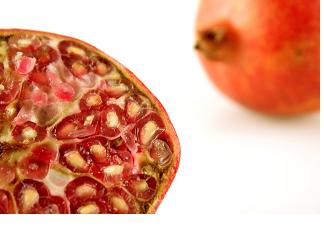
Pomegranates aren’t your most common fruit. I think I’ve had one, maybe twice, in my life. They’re kind of hard to eat and you can’t just walk down the street munching one (unless you’re more talented than I am).
But look at what they can do for you:
Considered one of the healthiest fruits in the world, it contains a huge array of vitamins, most specifically vitamins C and B.
It has very low sodium, and a high antioxidant content, which helps prevent and reverse hardening of the arteries.
It aids in weight loss as it cleanses the body and lowers cholesterol.
It can help prevent illness.
It can lower blood pressure.
It can reduce dental plaque.
It provides energy.
It’s also been found to prevent cancer, and – get this – pomegranate
juice kills the HIV virus. Scientists are currently working on ways to incorporate this knowledge into the fight against HIV and AIDS.
It can help lower LDL cholesterol and actually raises HDL cholesterol.
While blueberry and cranberry juices have both been praised for their high levels of anti-oxidants, pomegranates actually contain more. And not only can you eat the fruit and drink it as a juice, you can now also consume pomegranate supplements.
But what about the sugar content in pomegranate juice? It is a little high – 33 grams of sugar for a 16 oz. serving. You also get 39 carbs along with that. But you’re also getting so much benefit . . . as long as you don’t hook yourself up to an IV of the stuff, you should be fine.
Scientists are also investigating the benefits of pomegranate leaf extract, which reduces fat absorption and suppresses the appetite of obese laboratory mice. Well, if you happen to wake up tomorrow and discover that you’ve been turned into an obese mouse, that information will be highly useful to you. I think we’ll all be more interested in what they find when they test it on humans.
Related Blogs:
Super Healthy, Super Exotic Fruits
An Antioxidant Boost for Your Tea
Acai Berry – a New Tool in Weight Loss

